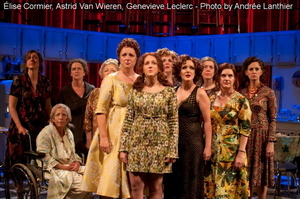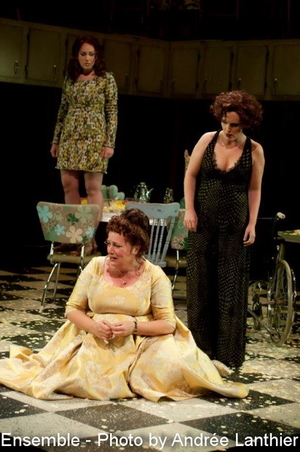It was St. Therese of Avila who said that more tears are shed over answered prayers than there are over unanswered ones. That’s pretty much the point behind Michel Tremblay’s classic play Les Belles Soeurs, The play focuses on Quebec housewife, Germaine Lauzon who wins a million trading stamps then invites her friends and neighbours over to share her good fortune with devastating consequences.
Tremblay has seen his play done so many times and so many ways he appears to have distanced himself from the work. But he was around for the opening at the Segal Centre of the English language premiere of the musical based on the original. The script has been adapted and reworked by Rene Richard Cyr (who directed the show), Daniel Belanger, Brian Hill and Neil Bartram who have turned it into a sensational, home-grown musical which has had its run extended until November 16.
Instead of a nostalgic theatrical artifact this version, as produced by Allan Sandler, is an unexpectedly rewarding, incandescent re-imagining of the original. The cast of twelve women could not be better, starting with Astrid Van Wieren’s gutsy performance as Lauzon and Elise Cormier as her delinquent daughter, Linda. The songs shed light on the blue collar characters and the lyrics are especially clever – who else would think of rhyming “Chevrolet” with “Gaspe?”
 Genevieve St. Louis seethes as the poisonous Marie Ange Brouillette who from the start admits that she is jealous of Lauzon’s good fortune. Lisa Horner is perfect as the haughty Lisette du Courval, who believes herself a cut above her neighbours. Valerie Boyle’s Yvette Longpre literally rocks into her number, Claudette’s Wedding Day a breathlessly overwrought description of an event none of the others have been to.
Genevieve St. Louis seethes as the poisonous Marie Ange Brouillette who from the start admits that she is jealous of Lauzon’s good fortune. Lisa Horner is perfect as the haughty Lisette du Courval, who believes herself a cut above her neighbours. Valerie Boyle’s Yvette Longpre literally rocks into her number, Claudette’s Wedding Day a breathlessly overwrought description of an event none of the others have been to.
Lili Connor’s love-starved Des Neiges Verette delivers an affecting, My Travelling Salesman a bittersweet song about her aching desire for affection. Stephanie McNamara is striking as Lauzon’s sister Rose, and Genevieve Leclerc is sympathetic as their prodigal sister, Pierrette Guerin. Jocelyne Zucco, as the wheelchair bound geriatric Olivine Dubuc, illuminates the stage with her face. Her especially beatific smile as the cast sings an Ode to Bingo is scene-stealingly delicious.
Paula Wolfson is adorable as the shyly sensitive Angeline Sauve, who takes illicit pleasure in sneaking away for a drink in a “sin bin” and Marcia Tratt is impressive as her piously astringent friend, Rheauna BIbeau. Jean Bard’s set is ingenious, a perfect 1950’s Plateau district kitchen whose cupboard doors open to serve as both as a candle-lit chapel or a tawdry nightclub. Meredith Caron’s costumes capture the period perfectly.
 The play offers a snapshot of Quebec Catholicism of the late 50s and early 60s, when women spent “every evening on their knees, shouting in the darkness for so long,” when housewives stopped what they were doing to recite the rosary, and women sometimes were trapped in cruel and heartless marriages because it was expected of them. These matriarchs hope to pray their way out misery but in the meantime are, for the most part, a mean and spiteful bunch. The times are captured perfectly in the song, If Life was a Movie and finally in the hauntingly cathartic and liberating finale, I should Have Asked for the Moon. The ending makes it clear, however, there is more to faith and life than the things that trading stamps can buy. Chris Barillaro does a fine job of conducting the live band. The orchestration is impressive, the harmony captivating. If there isn’t an original cast recording planned, there should be.
The play offers a snapshot of Quebec Catholicism of the late 50s and early 60s, when women spent “every evening on their knees, shouting in the darkness for so long,” when housewives stopped what they were doing to recite the rosary, and women sometimes were trapped in cruel and heartless marriages because it was expected of them. These matriarchs hope to pray their way out misery but in the meantime are, for the most part, a mean and spiteful bunch. The times are captured perfectly in the song, If Life was a Movie and finally in the hauntingly cathartic and liberating finale, I should Have Asked for the Moon. The ending makes it clear, however, there is more to faith and life than the things that trading stamps can buy. Chris Barillaro does a fine job of conducting the live band. The orchestration is impressive, the harmony captivating. If there isn’t an original cast recording planned, there should be.
As in any adaptation, some things are lost and some are gained. Purists may complain that some of the coarse edges of the original stage play have been made smooth and the ending sugar-coated in the musical version. Never mind. This production of Les Belles Soeurs is a triumph in its own right.
